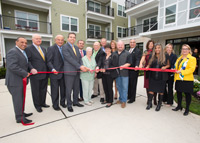110-Unit Project Replaces Complex Partially Destroyed by Superstorm Sandy
Middletown, NJ – The Christie Administration today recognized the grand opening of Bayshore Village, an affordable rental community for seniors that was developed by Community Investment Strategies and Middletown Senior Citizens Housing and financed in part with Superstorm Sandy recovery funds provided by the New Jersey Housing and Mortgage Finance Agency (NJHMFA).
Located in the Port Monmouth section of Middletown, Bayshore Village replaces a former 12-building housing complex that was developed by the U.S. Department of Housing and Urban Development (HUD) in the early 1970s and run by Middletown Senior Citizens Housing. Five of the buildings had been destroyed by Superstorm Sandy, leaving 40 of 96 units uninhabitable.
All of the complex’s buildings were demolished as part of the Bayshore Village project and all residents were relocated during construction. The $31.8 million three-story building built in the complex’s place is above flood elevation and provides 109 housing units for seniors aged 62 years and older who earn less than 60 percent of the Area Median Income (AMI) and one unit for a superintendent. Six units are set aside for special needs residents. Rents on the one-bedroom units range from $755 to $889, and from $905 to $1,025 for two-bedroom units.
"Bayshore Village has transformed a rental complex hit hard by Sandy into a vibrant housing development for seniors on fixed incomes and individuals with special needs,” said New Jersey Department of Community Affairs (DCA) Commissioner Charles A. Richman, whose department administers many of New Jersey’s Sandy recovery programs and who also serves as chairman of the NJHMFA board. “Sandy recovery funds continue to help address the housing needs of seniors and special needs populations who are oftentimes more vulnerable to natural disasters due to damaged or displaced support networks, accessibility issues, or increased cost of living.”
NJHMFA provided considerable funding for the project, including $16.9 million in construction and permanent financing, and $754,205 from the Multifamily Rental Housing Production Loan Program. The Agency also provided $18.9 million in federal Community Development Block Grant Disaster Recovery assistance through the Fund for Restoration of Multifamily Housing (FRM). The FRM program was created following Superstorm Sandy to provide for-profit and nonprofit housing developers an opportunity to secure zero-interest and low-interest loans to finance the development of affordable housing in the nine counties most impacted by the storm. Additionally, NJHMFA awarded the project 4 percent Low Income Housing Tax Credits, which were expected to generate $8.1 million in private equity.
In four rounds of FRM funding, NJHMFA has awarded over $650 million to 76 projects, representing over 6,000 rental units, and resulting in nearly $1.6 billion in total investment. To date, 45 projects, representing nearly 3,100 units, have been completed.
“We are very proud of our efforts to help in the effort to rebuild and restore in the five years since Superstorm Sandy,” said NJHMFA Executive Director Anthony L. Marchetta. “NJHMFA provided the capital financing required to make Bayshore Village possible by leveraging Sandy recovery dollars with our existing programs and financing, and the result is this beautiful development.”
“Middletown was ground zero for the interagency relief efforts working hard to bring normalcy back to the Garden State after Hurricane Sandy. To that end, it’s only appropriate that we gather here today to celebrate another example of critical partnerships – Bayshore Village,” said Lynne Patton, HUD Regional Administrator for New York and New Jersey. “It’s great to see how $18.9 million in HUD disaster recovery funding through NJHMFA can transform lives, and reassuring to know that this development was built with resiliency in mind to withstand the impact of potential future disasters.”
During the first 90 days of lease up, priority for residency will be given to individuals who were displaced by or experienced major or severe storm damage from Superstorm Sandy. Storm-impacted residents can learn more about affordable housing projects funded with Sandy recovery dollars by visiting the New Jersey Housing Resource Center at www.njhrc.gov and clicking on "Priority Housing for Sandy-Impacted Residents," which will take you to a website listing flyers on available housing by county. Thus far, 25 Sandy-impacted residents are living at Bayshore Village.
The development at Shoal Harbour Court is in a neighborhood of single-family homes, near the Henry Hudson Trail and other open space, and close to Route 36 with extensive commercial development. All apartments include patios/balconies, Energy Star appliances, washer/dryer hook-ups and central air conditioning. The building also includes a fitness room, computer room, community room with catering kitchen, library, and wellness center.
Collaborative Support Programs of New Jersey (CSPNJ) serves as the social service provider for Bayshore Village and provides a dedicated service coordinator who is available on-site and off-site as needed. CSPNJ provides a full range of services, including referrals, screening and assessment services for residents; linkages to education resources; employment training; and strong wellness and recovery approaches.
Community Investment Strategies, Inc., based in Lawrenceville, NJ, is a certified woman-owned business enterprise that specializes in multifamily housing, including senior housing and mixed-use redevelopments, as well as market-rate and affordable housing.
NJHMFA estimates that the Bayshore Village project generated approximately $50 million in one-time economic output, defined as the total value of industry production, such as sales and business revenues. During construction, the project supported approximately 301 direct and indirect/induced full-time equivalent jobs, and generated over $1.8 million in state and local taxes. Now complete, Bayshore Village is expected to continue to add value to the community by providing approximately $5.6 million in ongoing economic output, about 31 direct and indirect/induced full-time equivalent jobs, and over $317,000 in state and local taxes annually.
For more information on FRM Program and other NJHMFA programs, please visit www.njhousing.gov.
 Official Site of The State of New Jersey
Official Site of The State of New Jersey
